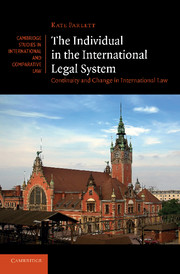Book contents
- Frontmatter
- Contents
- Foreword
- Acknowledgements
- Select list of abbreviations
- Table of cases
- Table of treaties
- Part I The Framework
- Part II The Individual in International Law
- 2 The individual and international claims
- 3 The individual in international humanitarian law
- 4 The individual in international criminal law
- 5 The individual in international human rights law
- Part III Reassessing the Framework
- Bibliography
- Index
- CAMBRIDGE STUDIES IN INTERNATIONAL AND COMPARATIVE LAW
- References
5 - The individual in international human rights law
Published online by Cambridge University Press: 19 May 2011
- Frontmatter
- Contents
- Foreword
- Acknowledgements
- Select list of abbreviations
- Table of cases
- Table of treaties
- Part I The Framework
- Part II The Individual in International Law
- 2 The individual and international claims
- 3 The individual in international humanitarian law
- 4 The individual in international criminal law
- 5 The individual in international human rights law
- Part III Reassessing the Framework
- Bibliography
- Index
- CAMBRIDGE STUDIES IN INTERNATIONAL AND COMPARATIVE LAW
- References
Summary
Introduction
International human rights law is widely acknowledged as having had a transformative effect on the position of the individual in the international legal system in the post-1945 period. But while there is widespread acceptance of the importance of human rights protection in international law, there is considerable confusion about its basis and role in international law. It is often suggested that human rights are defined as those fundamental rights to which every person is entitled to ‘merely by virtue of having been born a human being’; the character of human rights is commonly explained by reference to individual integrity and human dignity. From a rhetorical point of view, the reference to human dignity may be powerful, but it suggests that human rights adhere to individuals through some inherent capacity and fails to acknowledge that international human rights law is tied to the state system of international law: that human rights were initially (at least) conceived as rights held by individuals as against the state, without horizontal effect as between non-state actors.
This chapter explores the extent to which international human rights law has engaged individuals. Of interest here is not the content of the rights in question, but how human rights law structurally treats individuals. The first section of the chapter considers the development of the abolition of slavery.
- Type
- Chapter
- Information
- The Individual in the International Legal SystemContinuity and Change in International Law, pp. 278 - 340Publisher: Cambridge University PressPrint publication year: 2011



